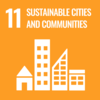Most UK councils have now created or are developing climate action plans. With many ambitiously targeting net zero by 2030. My research focussed on South Gloucestershire Council’s 2030 target, and the final element of the Carbon Management Hierarchy – offsetting. My method was three-fold. Firstly, an estimation of residual emissions in 2030 for the region. Secondly, an assessment of South Gloucestershire’s capacity for carbon sequestration. Finally, an interview stage with a series of technical and industry representatives. The research found that saltmarsh creation and restoration, woodland creation, and biochar are appropriate mechanisms for balancing emissions within the region.
It supports discourse around what is often seen as a poison term within the climate debate – offsetting. Encouraging collaboration and innovation to provide new solutions in support of near-term climate targets. My research has been an important contribution to South Gloucestershire Council’s Plan 2030 providing part of the baseline from which the mitigation and offsetting problem can be framed and through which the Council will implement new or enhanced actions to secure its area wide net zero ambition by 2030.
The judges appreciated the impact of the research in this important area. A good application and potential to share findings across other sectors.
“Sustainability is at the heart of Transforming Futures, UWE’s Strategy 2030. Winning this Green Gown award is a welcome recognition for the many actions of students and staff that are helping to make UWE Bristol a more sustainable university.”
Professor Steve West, Vice Chancellor, President and CEO


